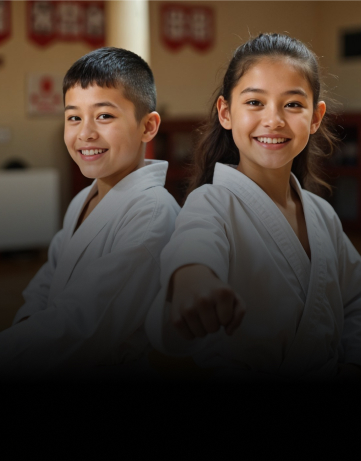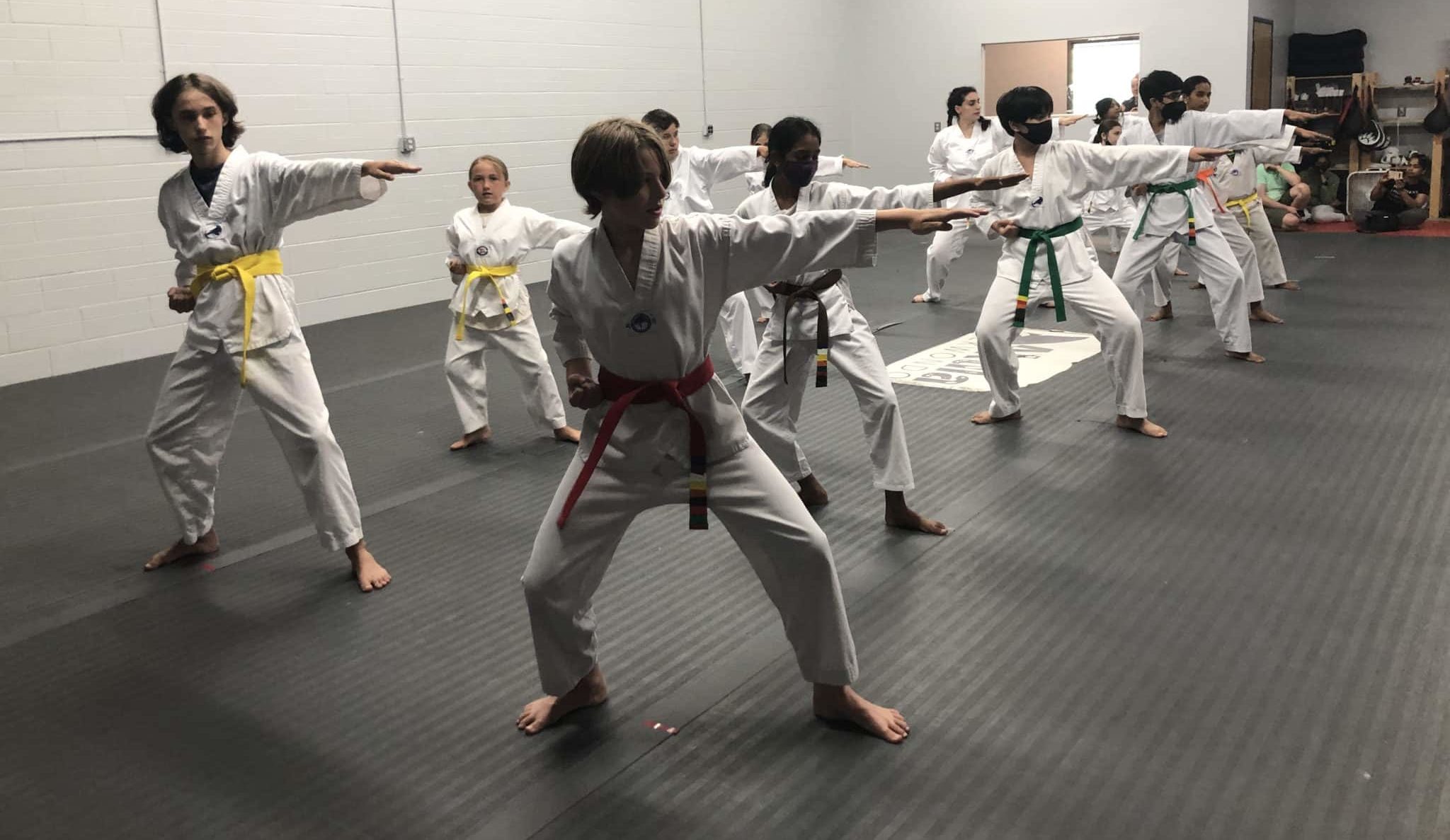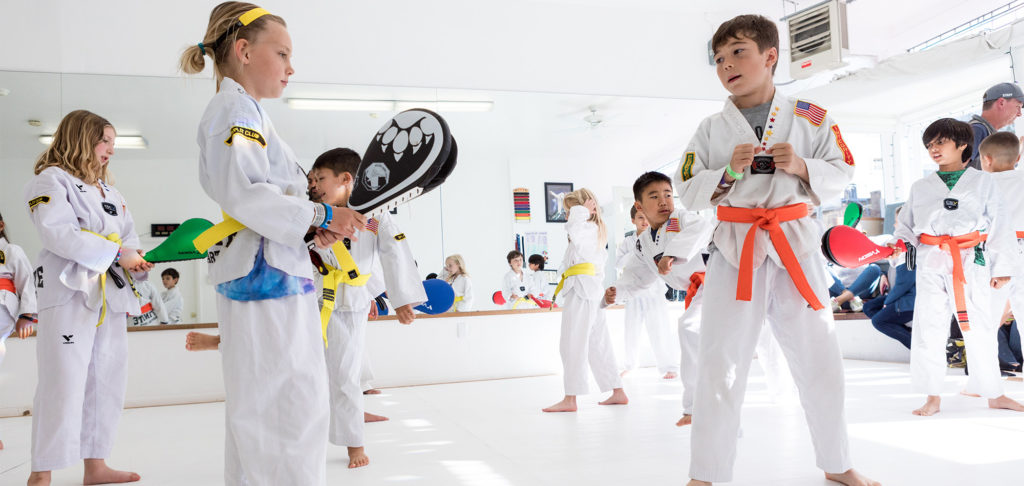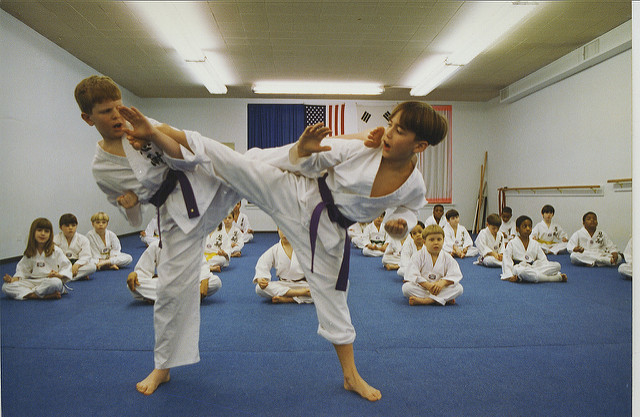How Martial Arts for Kids Can Boost Self-confidence and Self-control in Young Martial Artists
Karate for kids supplies an one-of-a-kind possibility to develop confidence and technique in young martial musicians. As they learn brand-new methods and face obstacles, they not only get skills yet also develop a solid feeling of self-regard. This structured environment urges them to appreciate the journey of improvement. However exactly how does this training translate into their everyday lives? Discover the much deeper connections that make karate even more than just a sporting activity.
The Significance of Confidence in Childhood Development
Self-confidence is an essential foundation in childhood advancement. When you nurture your youngster's self-esteem, you empower them to encounter difficulties, take dangers, and express themselves freely. Children with confidence are much more going to discover social circumstances and brand-new tasks, which can result in enduring relationships and valuable experiences.Encouraging your kid to get out of their comfort zone promotes strength. They find out that failure isn't completion yet rather a stepping rock to success. By commemorating their success, no issue how tiny, you help them recognize their capabilities and worth.In this journey, assistance and favorable support from you play an important duty. Whether it's via appreciation or simply being present, your involvement increases their confidence. As they grow, this confidence becomes a long-lasting asset, equipping them to navigate both challenges and opportunities with a strong sense of self.
Exactly How Karate Instructs Discipline and Focus
Martial arts aids you build discipline and focus via its organized training routine. As you exercise mindfulness throughout each session, you'll discover to focus much better both on and off the mat. Plus, establishing and attaining objectives in karate reinforces your capability to remain mindful and committed.
Structured Training Regimen
While you take part in karate training, you'll quickly uncover how an organized routine imparts self-control and emphasis in young experts. Each course complies with a particular layout, consisting of warm-ups, strategy method, and sparring. This consistency teaches you to value the process and devote to improvement. As you find out methods and forms, you establish a sense of responsibility for your very own progress.The structured setting motivates you to establish objectives, whether mastering a brand-new belt or improving a kata. You'll find that remaining focused during drills and classes develops your concentration. The technique you cultivate in martial arts extends past the dojo, favorably affecting your schoolwork and daily regimens. Each session reinforces the relevance of commitment, aiding you turn into an extra disciplined person.
Mindfulness in Practice
As you exercise martial arts, you'll find that mindfulness ends up being a vital part of your training. Each action requires your complete attention, assisting you remain concentrated on today moment. You'll discover to disregard distractions and concentrate on your breathing, activities, and purposes. This heightened understanding hones your reflexes and boosts your discipline.During sparring or kinds, you'll find the importance of being psychologically present - Karate Salisbury MD. You'll see exactly how this emphasis not just improves your method however likewise develops your self-confidence. By exercising mindfulness in martial arts, you grow patience and durability, necessary attributes that extend past the dojo. By doing this, martial arts teaches you to harness your mind, aiding you create a regimented technique to challenges both on and off the mat

Setting Goal Techniques
Setting objectives in martial arts isn't practically making belts; it's a powerful method to grow discipline and emphasis. When you establish specific, possible targets, you create a roadmap for your progression. For example, rather than simply intending to improve your kicks, try concentrating on mastering a specific strategy each month. This technique maintains you motivated and engaged.Breaking down larger goals into smaller sized, convenient actions helps you track your progress and celebrate little triumphes along the way. Whether it's improving your position or raising your sparring endurance, every objective reinforces your commitment. As you achieve these goals, you'll build confidence in your skills and establish a strong sense of self-control that prolongs past the dojo into day-to-day life.
Structure Strength Via Martial Arts
Fighting style, specifically martial arts, supplies children an unique opportunity to build resilience in a supportive environment. In courses, they encounter obstacles that press their limits, whether it's grasping a new technique or competing with a companion. Each trouble, like a missed out on kick or a shed suit, ends up being a chance to find out and grow.As they exercise, youngsters learn to embrace pain and maintain trying, even when points get tough. They uncover that failing isn't completion; it's component of the journey. This attitude assists them get better stronger, not just in the dojo, however in daily life.With each challenge they overcome, your child constructs confidence in their capacity to deal with challenges, sustaining their decision. Through martial arts, they'll understand that strength isn't almost physical stamina; it's about mental grit and perseverance, empowering them to encounter whatever life throws their method.
The Role of Respect in Martial Arts Training
Regard is a foundational principle in karate training, cultivating a culture of self-control and camaraderie amongst students. When you step onto the dojo flooring, you're not just discovering strategies; you're also discovering to appreciate your trainers, peers, and the art itself (Karate Salisbury MD). Bowing at the start and end of class isn't just a procedure; it symbolizes your acknowledgment of others' efforts and dedication.As you establish shared regard, you'll discover it enhances your discovering experience. You'll pay attention more attentively to your teacher and gain understandings from fellow students. This atmosphere urges constructive criticism and support, enabling every person to expand together.Moreover, regard grows self-discipline. Identifying the worth of effort and humility helps you stay focused on your training. Consequently, this regard translates right into your day-to-day life, boosting your communications and relationships outside the dojo. Through karate, you discover that regard is crucial for personal growth and community building
Setting Goals and Achieving Success in Martial arts

Social Abilities and Teamwork in the Dojo
While training in the dojo, youngsters normally create important social abilities and synergy abilities. As they practice alongside peers, they discover to interact properly, share room, and support each other. Each class provides possibilities for cooperation, whether it's throughout partner drills or group exercises. This teamwork fosters friendships and develops a feeling of belonging, making the dojo a nurturing environment.Kids additionally obtain valuable conflict resolution skills. When they experience difficulties, such as arguments throughout sparring, they learn to navigate these circumstances constructively. They practice patience and compassion, recognizing that every person has different strengths and weaknesses.Moreover, taking part in group tasks grows a sense of accountability. You'll see your child learning to rely upon colleagues and take duty for their duty in a group. These experiences not only boost their fighting styles journey but additionally outfit them with social tools they'll carry right into other areas of life.

The Long-Term Benefits of Karate Beyond Childhood Years
As children grow up and move right into the adult years, the benefits of karate prolong much past the dojo. You'll find that the self-control and emphasis found out via martial arts can translate into your academic and expert life. Setting and achieving objectives in martial arts cultivates a strong work principles, which can press you to excel in any kind of endeavor.Moreover, the confidence obtained from sparring and grasping methods can improve your self-confidence, aiding you take on obstacles head-on. This strength comes to be invaluable as you face the uncertainties of adulthood.Additionally, the social skills created via teamwork and friendship in the dojo can cause much better connections in both personal and professional balls. You'll discover to communicate efficiently, willpower conflicts, and build an encouraging network.Ultimately, karate shapes not just skilled martial artists, but well-shaped people prepared to handle the world.
Regularly Asked Concerns
What Age Is Best to Beginning Martial Arts for Kids?
You can begin karate as early as age 4 or five, but it usually relies on your kid's maturation and rate of interest. Finding a course that fits their age and power level makes a big distinction.
Are There Any Kind Of Health And Wellness Benefits From Exercising Karate?
Yes, exercising karate offers countless health and wellness advantages. You'll improve your stamina, control, and versatility while boosting cardio fitness. Plus, it boosts focus and mental health, making it a wonderful selection for overall physical and mental health and wellness.
Just How Frequently Should Youngsters Go To Karate Classes?
You must encourage your kids to go to karate courses a minimum of two to three times a week. Consistency assists them find out techniques successfully and create abilities, making their experience more gratifying and pleasurable in the lengthy run.
Can Karate Assist With Managing Stress And Anxiety in Children?
Yes, karate can assist handle stress and anxiety in kids. It shows emphasis and self-constraint while giving a safe electrical outlet for energy. You'll discover your kid growing much more positive and calm as they exercise routinely.
What Gear Is Needed for Kids Beginning Martial Arts?
